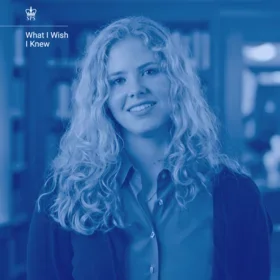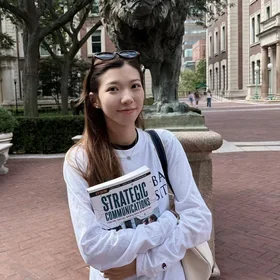Jeff Bull is a Navy SEAL Chief Warrant Officer. He joined the Navy 17 years ago when he was only 19 years old. In the spring and summer of 2014, when he was deployed in Afghanistan, he was concurrently finishing his coursework for an online undergraduate program, a B.S. in Strategic Studies and Defense Analysis at Norwich University. After he completed his undergraduate studies, he wanted to further enhance his skills in order to prepare for his imminent retirement from the military.
Jeff joined the M.S. program in Information and Knowledge Strategy (IKNS) at Columbia University. He’s currently officer in charge of Navy Special Warfare Detachment Kodiak, and the hybrid format of the program allows him to attend classes online, supplemented by brief, on-campus residencies at Columbia each semester. The course of study helps him in his current role, in which he trains SEAL candidates prior to their team assignments, and will ultimately prepare him for a career in the private sector.
During one of his residencies, we spoke with Jeff about being a graduate student while on active duty, applying knowledge strategy to the Navy, and indulging his passion for helping organizations to use knowledge management.
What drew you to the IKNS program?
A couple of years ago, I became a warrant officer. SEAL warrant officers have technical expertise, and we typically work as training officers in specialty areas to be able to disseminate knowledge and train others as they come up in the ranks.
I read [IKNS Lecturer] Kate Pugh's book, Sharing Hidden Know-How. A lot of the issues she was addressing in her book are what we struggle with as an organization on a regular basis. I had a conversation with Kate, and that was pretty much it; I was sold on the program.
Do you mean the typical IKNS challenges of managing a lot of data and a lot of team members?
Yes, a lot of data, but also [figuring out how to share] everyone’s specific skills and experiences across an organization. I think that challenge exists in the military for several reasons. Some of it is due to the military’s use of classified documents, and some of it is because the individual is so focused on their specific area that they don't take the time to share their knowledge. There’s a tactical operational perspective in which you're only concerned with your mission. Maybe you get to move into a training environment where you can impart your knowledge to others, but for those who are staying in the operational environment, you never really get that opportunity. You're deploying, you're being trained, you're coming back, deploying.
On the other hand, our military community is very big on AARs, “After-Action Reviews.” These are collected with good intention, and sometimes there's a repository mindset – “let's collect all these experiences.” But those records will eventually become dated. We [at IKNS] like to keep it malleable and fluid.
I think there's an opportunity to provide structure to knowledge practice, and I think that's what IKNS really does. We capture some of the explicit knowledge and also cultivate an atmosphere to increase collaboration and innovation among a group of experts. The individuals coming in may have some new ideas, too, and ultimately the organization will emerge with better results.
Can you tell me about the financial resources that are available to military personnel?
The Military and Veteran Affairs department at Columbia was super helpful and guided me through the application process. With the cost of my program, the GI Bill® ultimately covered about two semesters of tuition. I’m using student loans to cover the other two semesters.
As an active duty service member, I also qualified for other financing – including a $5,000 scholarship. There are definitely resources [for military personnel] in addition to the GI Bill®.
You spoke about driving efficiency and getting results in your organization, but how else do you plan to apply IKNS in your career?
Recently, I took over as the officer in charge in Kodiak, Alaska for our navigation, mountaineering, and survival phase of training in the SEAL Qualification Training pipeline. Every other month, about 40 students or so will join us, and we train them to ultimately become Navy SEALs.
And you would be using IKNS to streamline that training process.
Yeah, absolutely. The mantra within the SEAL teams has always been "work smarter, not harder." That certainly falls within the realm of IKNS. You're using knowledge and information to make more strategic decisions. My intention [with the Naval Special Warfare community] is to create the ability for students to gain knowledge and allow them to maintain access to that information, even after they leave.
Any last thoughts on the IKNS program?
IKNS can be applied across many industries. If you want to get into consultancy, IKNS is absolutely the answer. If you have an established skill set and you would like to learn how to enhance collaboration to help your enterprise overall, then IKNS is great for that as well. This cross-disciplinary skill set is really valuable in the job market.
GI Bill® is a registered trademark of the U.S. Department of Veterans Affairs (VA). More information about education benefits offered by VA is available at the official U.S. government Web site at http://www.benefits.va.gov/gibill.


